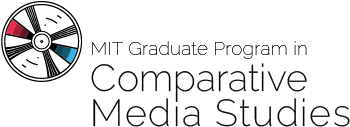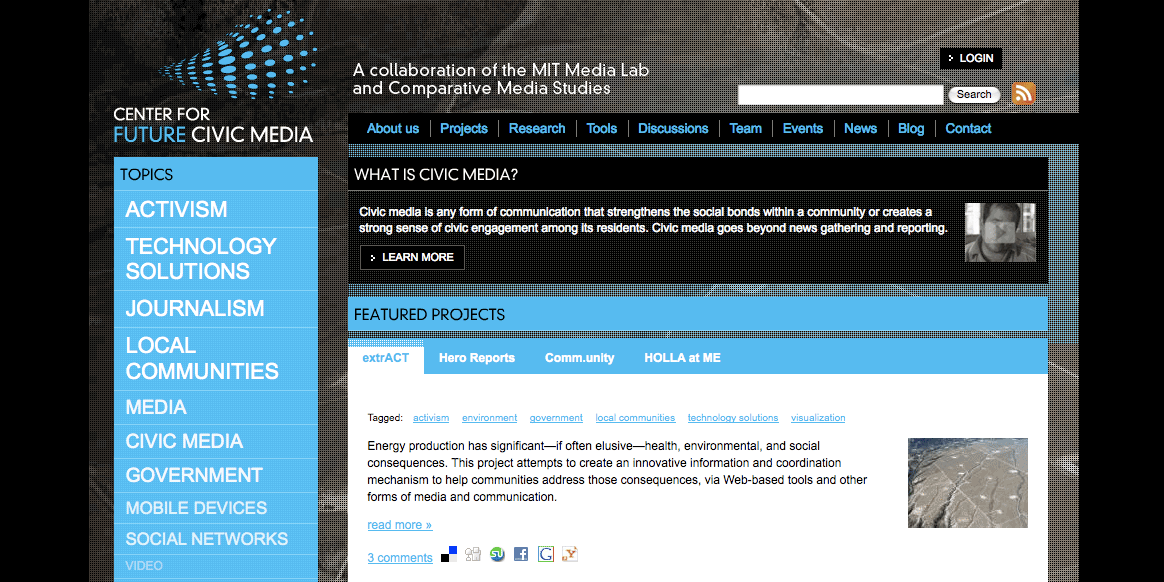Wish your local organization could solicit feedback on its work? Want to create and publicize an online or mobile tool that enhances civic engagement? Have an idea for community outreach but need to collaborate with others to make it happen?
This fall, MIT’s Center for Future Civic Media launched an ambitious new website at civic.mit.edu to address these challenges.
The Center was founded in 2007 in partnership with the MIT Media Lab and the Comparative Media Studies program. Its mission is to support research at MIT that creates innovative civic media tools and to test those tools in communities.
With its new site, the Center has already rolled out several MIT-based tools. ExtrAct, already featured in national news stories, is helping communities coordinate when approached by representatives of oil and gas companies.
Selectricity is a web- and mobile-based voting tool that helps groups make quick decisions. It therefore “helps communities make better decisions in better ways,” says creator Benjamin Mako Hill. For example, voters not only identify a top choice but also rank their preferences among remaining options, making consensus more likely when their second and third preferences overlap.
Another tool, Hero Reports, turns around the Big Brother-like “See Something/Say Something” trope by letting strangers post reports on public acts of generosity, kindness, and courage, rather than on suspicious behavior.
And Scratch, a programming language aimed at kids, teaches the skills needed in contemporary civic life by giving young people a tool to create interactive content.
But Center for Future Civic Media director Ellen Hume says promoting MIT’s own work is only a small part of the new site. “We hope to connect people and projects that innovate civic media tools and practices,” says Hume. She adds that the Center “offers this website as an intellectual hub for everyone around the world working in and on civic media.”
Hume, a long-time journalist and founder of the Center on Media and Society at the University of Massachusetts Boston, is quick to point out that visitors are encouraged to join discussions and post their own relevant civic media work. This work is then featured and is, in part, identified by location, tying people and technologies to their own communities.
Community projects already featured on the site include:
- Buy It Like You Mean It allows shoppers to scan a product’s barcode and immediately receive a trusted breakdown of the product’s supply-chain. Users can customize the information to help them choose products in keeping with their social values. Users thereby turn the point-of-purchase into a point-of-purpose. Do all manufacturers in the product’s supply chain abide by human rights standards? Do they make contributions to charity? Between two similar products, which one’s production process created less polution?
- Media Re:public and the Citizen Media Law Project, both of the Berkman Center for Internet and Society at Harvard Law School, address changes happening at the intersection of law and media.
- Many Eyes, developed by the Collaborative User Experience research group in IBM’s Cambridge office, creates easily interpretable visualizations for complex datasets. Visualizations already available on Many Eyes include the U.S. census, health spending, state home foreclosures, and citations between research papers. Users provide the data; Many Eyes translates the data into meaning, at a glance.
- New School Student Ambassadors brings together U.S. and Chinese students in a cross-cultural participatory learning environment in order to prepare learners for an increasingly diverse future.
- Spot.us supports community-funded reporting. People commission investigative reports on “important and perhaps overlooked” stories with tax-deductible donations, and if a news organization buys exclusive rights to a report, Spot.us reimburses the donations.
- Remembering 7th Street recreates Oakland’s jazz and blues scene of the 1940s and 1950s as a video game and virtual world, as way to show what is lost to urban decay and poorly executed development programs.
Visitors are encouraged to submit their civic media tools and to nominate their own projects. Simply visit civic.mit.edu.
The Center for Future Civic Media, a 2007 Knight News Challenge winner, is funded in part by the John S. and James L. Knight Foundation. Its new website was a collaboration between the Center and web consultancy Civic Actions.




